Docmercy
On this page, you find all documents, package deals, and flashcards offered by seller Docmercy.
- 667
- 0
- 0
Community
- Followers
- Following
667 items
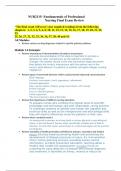
NUR2115- Fundamentals of Professional Nursing Final Exam Review
NUR2115- Fundamentals of Professional Nursing Final Exam Review *The final exam will cover your required readings from the following chapters: 1, 2, 3, 4, 5, 6, 8, 10, 11, 12, 13, 14, 15, 16, 17, 18, 19, 20, 21, 22, 23, 25, 26, 27, 31, 32, 33, 34, 36, 37, 38, 40 and 41. All Modules Review various nursing diagnoses related to specific patient problems Module 1-3 Concepts: Review importance of documentation of patient assessments Accurate documentation of this data is important to p...
- Exam (elaborations)
- • 14 pages •
NUR2115- Fundamentals of Professional Nursing Final Exam Review *The final exam will cover your required readings from the following chapters: 1, 2, 3, 4, 5, 6, 8, 10, 11, 12, 13, 14, 15, 16, 17, 18, 19, 20, 21, 22, 23, 25, 26, 27, 31, 32, 33, 34, 36, 37, 38, 40 and 41. All Modules Review various nursing diagnoses related to specific patient problems Module 1-3 Concepts: Review importance of documentation of patient assessments Accurate documentation of this data is important to p...
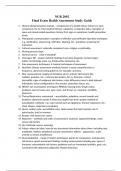
Final Exam Health Assessment Study Guide
NUR 2092 Final Exam Health Assessment Study Guide 1. History taking/symptom analysis – components of a health history (what is in each component, for ex. Past medical history); subjective vs objective data; examples of open and closed ended questions; history first; signs vs symptoms; health promotion levels 2. Therapeutic communication: examples of effective and ineffective (barriers) techniques e.g. clarification, sequencing, reflection, blaming, etc.; questions; preparing for interviews...
- Summary
- • 55 pages •
NUR 2092 Final Exam Health Assessment Study Guide 1. History taking/symptom analysis – components of a health history (what is in each component, for ex. Past medical history); subjective vs objective data; examples of open and closed ended questions; history first; signs vs symptoms; health promotion levels 2. Therapeutic communication: examples of effective and ineffective (barriers) techniques e.g. clarification, sequencing, reflection, blaming, etc.; questions; preparing for interviews...
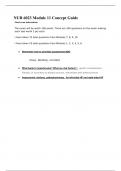
NUR 6023 Module 11 Concept Guide
NUR 6023 Module 11 Concept Guide Final exam information: The exam will be worth 200 points. There are 100 questions on the exam making each test worth 2 pts each. I have taken 75 total questions from Modules 7, 8, 9, 10. I have taken 25 total questions from Modules 1, 2, 3, 4, 5, 6 ● Remember how to prioritize assessment-ABC Airway - Breathing - Circulation ● What leads to hypertension? What are risk factors? : genetic predisposition, lifestyle, or secondary to disea...
- Exam (elaborations)
- • 19 pages •
NUR 6023 Module 11 Concept Guide Final exam information: The exam will be worth 200 points. There are 100 questions on the exam making each test worth 2 pts each. I have taken 75 total questions from Modules 7, 8, 9, 10. I have taken 25 total questions from Modules 1, 2, 3, 4, 5, 6 ● Remember how to prioritize assessment-ABC Airway - Breathing - Circulation ● What leads to hypertension? What are risk factors? : genetic predisposition, lifestyle, or secondary to disea...
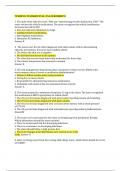
NURSING NUR2480 FINAL EXAM ROBERTO
NURSING NUR2480 FINAL EXAM ROBERTO 1. The male client asks the nurse, “Why am I experiencing erectile dysfunction (ED)?” The nurse reviews the client’s medications. The nurse recognizes that which classification increases the risk for ED? a. Non-steroidal anti-inflammatory drugs. b. Antihypertensive medications. c. Anticoagulant medications. d. Histamine H2 inhibitors. Answer: B 2. The nurses care for the client diagnosed with tuberculosis. Before discontinuing airborne precaution...
- Exam (elaborations)
- • 14 pages •
NURSING NUR2480 FINAL EXAM ROBERTO 1. The male client asks the nurse, “Why am I experiencing erectile dysfunction (ED)?” The nurse reviews the client’s medications. The nurse recognizes that which classification increases the risk for ED? a. Non-steroidal anti-inflammatory drugs. b. Antihypertensive medications. c. Anticoagulant medications. d. Histamine H2 inhibitors. Answer: B 2. The nurses care for the client diagnosed with tuberculosis. Before discontinuing airborne precaution...

Essentials of Pathophysiology – Final Exam Review Sheet
NUR 6023 Essentials of Pathophysiology – Final Exam Review Sheet Covers Material from Modules 1-10 1. Review the different levels of disease prevention such as primary, secondary, and tertiary as well as examples for each. LEVELS OF DISEASE PREVENTION- Primary- prevention of diseases- vaccination, handwashing, educating, social distancing Secondary- early detection before big problems. Eg- pap Smear or screening tests Tertiary- rehabilitation- eg- therapies. 2. Review the differences be...
- Exam (elaborations)
- • 13 pages •
NUR 6023 Essentials of Pathophysiology – Final Exam Review Sheet Covers Material from Modules 1-10 1. Review the different levels of disease prevention such as primary, secondary, and tertiary as well as examples for each. LEVELS OF DISEASE PREVENTION- Primary- prevention of diseases- vaccination, handwashing, educating, social distancing Secondary- early detection before big problems. Eg- pap Smear or screening tests Tertiary- rehabilitation- eg- therapies. 2. Review the differences be...
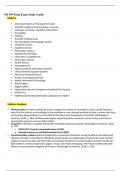
NR 599 Final Exam Study Guide
NR 599 Final Exam Study Guide Midterm • General principles of Nursing Informatics • Scientific synthesis of information in nursing • Concepts: computer, cognitive, information • Knowledge • Wisdom • Scientific Underpinning • The Foundation of Knowledge Model • Computer science • Cognitive science • Information science • Standard Terminology • Informatics Competencies • Information literacy • Health literacy • Meaningful Use • Patient-centered In...
- Exam (elaborations)
- • 12 pages •
NR 599 Final Exam Study Guide Midterm • General principles of Nursing Informatics • Scientific synthesis of information in nursing • Concepts: computer, cognitive, information • Knowledge • Wisdom • Scientific Underpinning • The Foundation of Knowledge Model • Computer science • Cognitive science • Information science • Standard Terminology • Informatics Competencies • Information literacy • Health literacy • Meaningful Use • Patient-centered In...

NR-507 Study Guide and Practice Questions
NR-507 Study Guide and Practice Questions 1. Types of immunity ch 7 & 8 a. Innate- natural epithelial barrier and inflammation the make innate resistance and protection pg. 191 Innate immunity includes two lines of defense: Natural barriers and inflammation. i. Natural barriers- physical, mechanical, and biochemical barriers at the body’s surfaces ii. Inflamation- associated with infection usually initiates an adaptive process that results in a long-term and very effective immunity to the...
- Exam (elaborations)
- • 59 pages •
NR-507 Study Guide and Practice Questions 1. Types of immunity ch 7 & 8 a. Innate- natural epithelial barrier and inflammation the make innate resistance and protection pg. 191 Innate immunity includes two lines of defense: Natural barriers and inflammation. i. Natural barriers- physical, mechanical, and biochemical barriers at the body’s surfaces ii. Inflamation- associated with infection usually initiates an adaptive process that results in a long-term and very effective immunity to the...
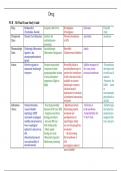
NUR 326 Final Exam Study Guide
NUR 326 Final Exam Study Guide Drug: Bethanechol (Urecholine, Duvoid) Atropine (Atro-Pen) Neostigmine (Prostigmin) Therapeutic Class: Urinary Tract Stimulant Antidote for anticholinerase poisoning Prevents breakdown of ACh Pharmacologic Class: Cholinergic (Muscarinic Agonist)- aka parasympathomimetic agents Anticholinergic (Muscarinic Antagonist) Reversible Cholinesterase Inhibitor Action: Selective agonist at muscarinic cholinergic receptors Occupies muscarinic receptors to bl...
- Summary
- • 51 pages •
NUR 326 Final Exam Study Guide Drug: Bethanechol (Urecholine, Duvoid) Atropine (Atro-Pen) Neostigmine (Prostigmin) Therapeutic Class: Urinary Tract Stimulant Antidote for anticholinerase poisoning Prevents breakdown of ACh Pharmacologic Class: Cholinergic (Muscarinic Agonist)- aka parasympathomimetic agents Anticholinergic (Muscarinic Antagonist) Reversible Cholinesterase Inhibitor Action: Selective agonist at muscarinic cholinergic receptors Occupies muscarinic receptors to bl...
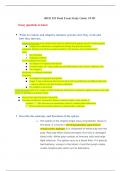
BIOS 255 Final Exam Study Guide AP III
BIOS 255 Final Exam Study Guide AP III Essay questions to know • What are innate and adaptive immune systems, how they work and how they interact. Adaptive immunity is the ability of the body to defend itself against specific invading agents ▪ Antigens are substances recognized as foreign that provoke immune responses Adaptive immunity has both specificity and memory and is divided into 2 types 1 Cell-mediated 2 Antibody-mediated In cell-mediated immunity: ▪ An antigen is re...
- Exam (elaborations)
- • 20 pages •
BIOS 255 Final Exam Study Guide AP III Essay questions to know • What are innate and adaptive immune systems, how they work and how they interact. Adaptive immunity is the ability of the body to defend itself against specific invading agents ▪ Antigens are substances recognized as foreign that provoke immune responses Adaptive immunity has both specificity and memory and is divided into 2 types 1 Cell-mediated 2 Antibody-mediated In cell-mediated immunity: ▪ An antigen is re...
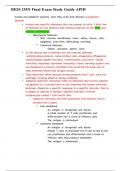
BIOS 255N Final Exam Study Guide APIII
BIOS 255N Final Exam Study Guide APIII Innate and adaptive systems, how they work and interact (Lymphatic System) • Innate (non specific)-defenses that are present at birth, 1)first line of defense are the physical and chemical barriers of the SKIN and mucous membranes,
- Exam (elaborations)
- • 23 pages •
BIOS 255N Final Exam Study Guide APIII Innate and adaptive systems, how they work and interact (Lymphatic System) • Innate (non specific)-defenses that are present at birth, 1)first line of defense are the physical and chemical barriers of the SKIN and mucous membranes,
